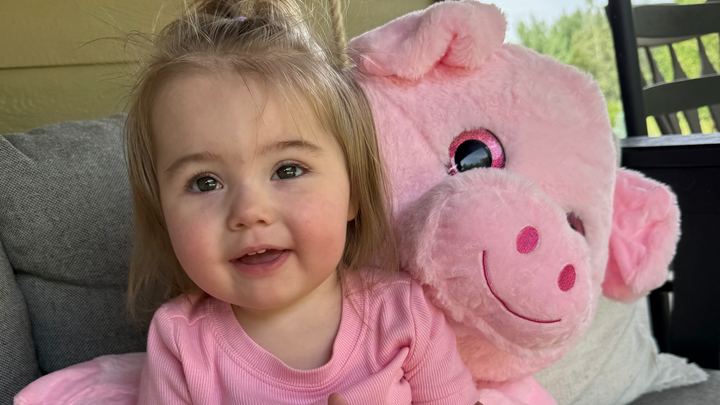Hi everyone!
We are hosting a Run/Walk to raise money to find a CURE for Rett Syndrome and help our Murielle and others.
The event is on October 19th at 9 AM at the parking lot near The HUB (303 W Water St West Bend, WI 53095). To sign up for the event, please visit the link here: https://linktr.ee/cureformurielle.
If you are interested in sponsoring this event, you can find more information at the link above. Every contribution, big or small, makes a real impact. If you can’t donate right now, sharing this fundraiser is also incredibly helpful. Thank you so much for your kindness and generosity. It means the world to us.
Read more about Murielle's story and Rett Syndrome and below.
Murielle's Story
Murielle was born a healthy baby girl weighing 7lbs, a few days before her due date. She was diagnosed with torticollis at birth and started physical therapy at one month old. At a few months old Murielle had vomiting episodes that caused her to become flaccid, pale and decreased oxygen that led to a 911 call with ambulance transport to
Children's Hospital in Milwaukee. This was the start of Murielle's Rett symptoms. Murielle would have an occasional large episode of emesis over the next several months. Her pediatrician at the time was not concerned and expressed that all babies develop at different times during the first year, although Murielle's weight was declining
putting her at 5% or less as she reached 12-15 months old. In December 2024, a on-call pediatrician saw Murielle and after his assessment and discussion with Caelyn (Murielle's mom) he referred her for genetic testing. Murielle was seen several times in the clinic for respiratory symptoms starting in December 2024 and diagnosed with viral
infections until February 2025 as Murielle's illness was not getting better. She was admitted to Children's Hospital in Milwaukee for failure to thrive as her weight declined to below 1%. Caelyn and myself demanded admission and answers. Murielle was admitted and diagnosed with Epilepsy, viral infection and concerns for possible aspiration during that admission. Ten days later, Murielle was not improving and spiked
a 105 temperature and was readmitted with possible sepsis and later diagnosed with aspiration pneumonia. Aspiration pneumonia is one of the top two causes of death in Rett Syndrome girls as many have difficulty swallowing. Murielle's genetic testing resulted positive for Rett Syndrome between the February discharge and March readmission to Children's Hospital. Murielle has had five hospital admissions to Children's Hospital from February to August 2025, all but one were all related to aspiration pneumonia and one was for a g-tube. Murielle now gets all her food and medications through a port through her stomach. She has lost all words except mama and dada, lost consistent eye contact, lost the ability to use her hands to pick up objects and hold them, lost the ability to swallow, lost stability with sitting, not able to crawl or stand independently or walk on her own. Murielle's team of Doctors/Nurse Practitioners and Specialists include:
-Physical Therapy and Occupational Therapy at Children's Clinic in Mequon one time a week
-Speech Therapy at Children’s is on hold at this time.
-Washington County Birth to Three program, PT/OT/Speech one to two times a week
-Rett Syndrome Specialist and Rett Syndrome Neurologist in St. Paul, Minnesota (Gillette Children's)
-Children's hospital in Wisconsin: Pulmonology, Cardiology, Neurology, Audiology, Complex Care, Orthopedics, Gastroenterology, Enteral Feeding, Equipment Team
-Optometrist in Cedarburg
-Aerodigestive team has been schedule for November 18th 2025
-Washington County Aging and Disability: Case Manager
Caelyn and Murielle are busy with appointments three-four days a week with appointments and traveling.
Rett Syndrome is a devastating disease and demands complex care through a multidisciplinary team. Caelyn and Murielle's dad, Trent, are struggling with finances as Caelyn had to quit her job to stay home with Murielle. It has impacted them financially, emotionally and physically.
Rett Syndrome Research Trust
RSRT's mission is to spur and support research that is leading to a cure for Rett Syndrome and related MECP2 disorders. Rett syndrome is a severe neurological disorder that is diagnosed primarily in girls and begins to manifest during the toddler years. It is a devastating disorder that afflicts 350,000 children and adults around the world. Rett is caused by a random mutation on the X chromosome. In 2020 RSRT launched a new phase of its research called CURE 360. The name reflects the fact that RSRT has Rett surrounded with the most promising approaches that attack the disorder at its genetic core. CURE 360 also ensures that the research incubated at RSRT moves into biopharma, a critical step for advancing to clinical trials.
More about the Disorder
After a seemingly normal first year the child begins to regress with developmental milestones. This regression can happen quickly over a number of days or very gradually over months. Often the first noticeable symptoms include: low muscle tone (hypotonia), eye crossing, decreased interactions with people or surroundings, and loss of hand function. The hallmark symptom of Rett is repetitive hand movements and wringing that can be constant, especially in younger children.
As time passes additional symptoms may include: loss of speech, trouble with balance and motor coordination, irritability and crying, and disrupted sleep patterns. Many also develop seizures, anxiety, breathing problems, gastrointestinal issues, orthopedic complications, as well as oral motor difficulties. It is important to note that Rett is a spectrum disorder, with children exhibiting a broad range of severity. Some individuals can say words of short phrases, can run, and feed themselves while others are unable to independently sit up. However, the symptoms in Rett are, unfortunately, oftentimes debilitating.

 Verified
Verified